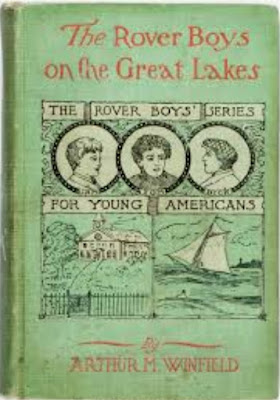The Rover Boys on the Great Lakes;
Or,
The Secret of the Island Cave
by Arthur M. Winfield
INTRODUCTION.
MY DEAR BOYS: This volume, "The Rover Boys on the Great Lakes," is a complete story in itself, but forms the fifth volume of the Rover Boys Series for Young Americans.
When first I started this series with "The Rover Boys at School," I had no idea of extending the line beyond three or four volumes. But the second book, "The Rover Boys on the Ocean," immediately called for a third, "The Rover Boys in the Jungle," and this finished, many boys wanted to know what would happen next, and so I must needs give them "The Rover Boys Out West." Still they were not satisfied; hence the volume now in your hands.
So far we have followed the doings of Dick, Tom, and Sam at dear old Putnam Hall, with many larks and sports; then out upon the broad Atlantic in a daring chase which came pretty close to ending in sad disaster; next into the interior of Africa on a quest of grave importance; and lastly out into the mountainous regions of the wild West, to locate a mining claim belonging to Mr. Anderson Rover.
In the present tale the scene is shifted to the Great Lakes. The three boys go on a pleasure tour and, while on Lake Erie, fall in with an old enemy, who concocts a scheme for kidnapping Dick, who had fallen overboard from his yacht in a storm. This scheme leads to many adventures, the outcome of which will be found in the pages that follow.
In placing this volume in my young readers hands I can but repeat what I have said before: that I am extremely grateful to all for the kind reception given the other Rover Boys stories. I sincerely trust the present tale meets with equal commendation.
Affectionately and sincerely yours,
EDWARD STRATEMEYER.
April 12, 1901
About the Author
The PDF might take a minute to load. Or, click to download PDF.
If your Web browser is not configured to display PDF files. No worries, just click here to download the PDF file.




No comments:
Post a Comment